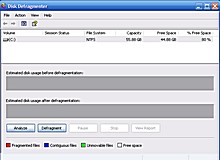 More than 42% of PC users neglect to defragment their computers, according to a survey conducted by online opinion polling and market research service provider Vizu Corporation.
More than 42% of PC users neglect to defragment their computers, according to a survey conducted by online opinion polling and market research service provider Vizu Corporation.
Moreover, Nearly 16% of those who answered the poll said they had “no idea” what disk defragmentation is, while more than 26% said they never defrag their machines.
Defragmentation reorganizes the file fragments on a hard disk into contiguous clusters that help speed response time. Tests have shown that activities such as word processing, email searches, Web surfing, and anti-virus and spyware scans can take almost 15 times longer on hard drives that have not been defragged than on those that have.
Make it a habit to defrag your personal computer every single day, so you will don’t have to suffer its dire consequences. It usually takes less than 30 minutes per day. For those who have no idea about this, read the Elder Greek for a simple tutorial on Disk Defragmenter Utility.
Originally posted on August 16, 2007 @ 11:44 pm
I have already suffered the consequences of postponing this task. Response on clicking on any icon to open programs took minutes ( some dont open and just hang). Comparing it to “a disease which spreads silently’ to manisfest itself as slow scans, lags and freezes is an apt analogy.
Defragging periodically is very helpful to keep the PC’s performance levels from deteriorating. SInce the hard drive is usually the bottleneck in system performance, it makes sense to keep it in good shape. A fragmented drive reduces performance.
I don’t have to remember to defrag since I use the defragmenter Diskeeper which defragments my drives automatically whenever file-fragmentation threatens to be a problem. Does not need any intervention on my part.